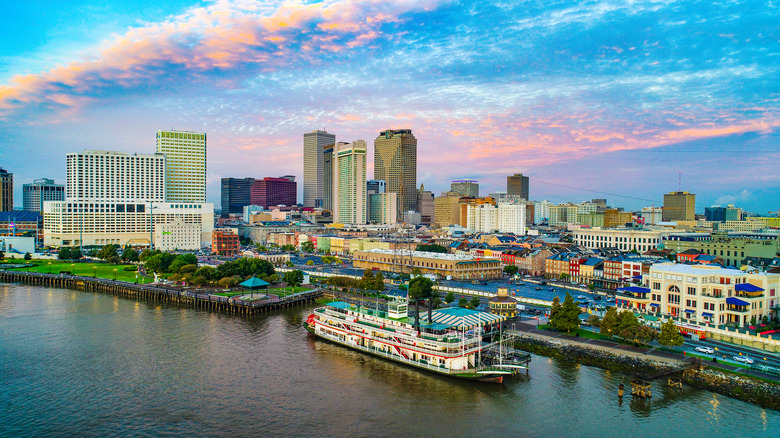Driving Or Flying: Which Is Better When Traveling On A Budget?
Summer travel can be expensive. Americans tend to take annual vacations when school's out, work slows, and the weather's warm. Using dynamic pricing models, this increase in travel often translates to higher costs for accommodations, airfare, and other travel-related expenses. For those traveling on a budget, choosing between flying and driving may be one of the most important planning decisions. While many may assume a well-planned road trip is typically less expensive than flying, this can depend on a number of factors.
Historically, many have viewed flying as a more luxurious mode of travel. We've been marketed images of airline passengers with soothed half-smiles under eye masks. They comfortably recline as snow-white clouds pass by the window and assertive flight attendants pass in the aisle. In contrast, we've seen National Lampoon's Vacation movies that present road trips as inexpensive yet ill-fated and wayward journeys with trouble around every bend.
However, in the modern landscape of travel, neither of these scenarios is broadly accurate. Sure, you can pay for first-class airfare with reclined smiles included in the price. Similarly, you can plan a road trip like you're in a Chevy commercial. But if you're traveling on a budget, the decision to fly or drive will depend largely on the route, if you're traveling with a group or solo, and the associated expenses of flying or driving.
Gas costs versus airfare with luggage
First, let's start with the route. Obviously, if your destination is 1,000 miles away, then flying will definitely save you time. However, to keep our primary focus on finances, we won't include time-saving considerations. Instead, let's first start with the gas cost of driving versus paying for airfare.
According to the U.S. Department of Energy, the average fuel economy of newish cars is around 25 miles per gallon. You own this averagely fuel-efficient vehicle and are considering a trip from Washington, D.C. to New Orleans, which is roughly 1,000 miles. This will take 40 gallons of gas to complete, and in this scenario, the current average cost of gas is $3.50. So, you'll spend around $140 on gas one-way and $280 for a roundtrip.
If you want help with your math (or want more exact numbers,) there are plenty of websites for calculating gas costs that incorporate your route, car, and regional gas prices. But, for our purposes, gas will cost $280. The drive takes 16 hours, so you prefer to divide the trip into two legs. You can stay in Chattanooga, TN for $100 at a three-star hotel on the way and back. For just the cost of gas and accommodations, your trip is now $480. After plotting your road trip, you find a flight for $300 with an extra $50 for one checked bag. Your flight saves you $130 (and two days). Ruby Falls in Chattanooga will have to wait.
Traveling solo versus group trips
The aforementioned cost comparison is pretty rudimentary, as we only considered the cost of transport and travel-related lodging. On this two-day road trip, you'll also have four meals out, which we'll round to $60. If flying, you'll skip eating at the airport, but the two rideshares to and from Dulles in D.C. cost $60, so we'll consider these two costs a wash. Without a car, however, you may want a rental in New Orleans for the week, which is another ($300) consideration.
These associated travel costs will depend largely on your personal preferences. However, the size of your travel group will really start to move the cost-analysis needle in your decision-making. If you're traveling with a family of four, that $350 flight is now $1400, which is around three times more expensive than driving and staying in Chattanooga for a night. In this case, that road trip with a visit to Ruby Falls makes a lot of financial sense. But if you're traveling solo, booking that domestic flight will probably be Big Easier on your wallet.
And this seems like a common conclusion. If you're footing the bill for group travel, such as a family vacation, it's typically less expensive to drive, but flying will often save you money and time when traveling solo. Maybe Chevy was right.


